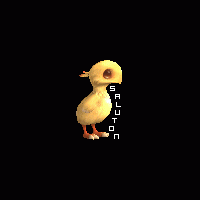Повідомлення: 25
Мова: English
Aubright (Переглянути профіль) 8 січня 2013 р. 07:40:26
Breto (Переглянути профіль) 10 січня 2013 р. 17:01:47
In World of Warcraft's Azeroth, though, orcs have no relation to elves or goblins, and aren't even from the same planet. Other settings have their own tweaks. Personally, I like the "Orĥo" solution (and would've suggested it myself if there weren't a 3-day waiting period to post; congrats on making me make an account by the way); "orĥo" echos the Sindarin orch, and frankly, "ĥ" doesn't seem to have enough to do anyway.
I think "Draŭo" is a fine term for the Drow. Lots of settings have dark elves, but D&D's Drow are kind of a special case. I went with "Drovo" once before, when I was trying to translate one of my D&D books as Esperanto practice. "Nigrelfo" sounds like a better term to me than "malluma elfo", but I may be taking the term "malluma" too literally. I've noticed that several languages like to use "black" where English prefers "dark", and I think English used to do likewise, once upon a time, so "nigrelfo" for "dark elf" sounds just fine to me.
Regarding the gnomoj/nanoj hiccup with dwarves...I see Vikipedio has an article (however short) about "la mita nano", so I suppose some people at least consider that a proper usage now, but it rubs me the wrong way. "Gnomo" is a mythical figure, a Gimli-dwarf of Lord of the Rings. "Nano", however, is glossed as dwarf or midget, that is, a Tyrion-dwarf of Game of Thrones (and also of the real world). The term "dwarf" in English has come to be used for both, but hard as it is to believe the mythical Germanic dwarves were originally not even small. There are very old renditions that depict them as man-sized. They shrunk, like elves and fae ktp, as Christianity moved in and turned them into fairy tales. To me, using "nano" here, because of its etymology, comes across more as "wee one" than dwarf.
(Besides, if we're looking at current 4th edition D&D, "gnome" might be better translated as "elfeto" anyway, which leaves "gnomo" available for the dwarves.)
eojeff (Переглянути профіль) 11 січня 2013 р. 04:03:29
You're right, nano means midget in Esperanto. So, it won't do for fantasy dwarves. Is Dwarf (as a mythological being) recognizable internationally? If so, I suggest simply Esperantizing the word under rule 15.
Dwarf is an interesting word: Dwarf (sing.) and Dwarves (pl.) and etymologically related to the Scandinavian word Dvergar. So, something like Deverĝaro strongly appeals to me. Though, sourcing from the English Dwarves, Dŭarvo might work just as well. I'm partial to the former. A Google search for both terms results in zero hits. Son, it's unlikely that either collides with an existing Esperanto word.
I agree with you on D&D gnomes and elfeto, that works. What do you propose for the general term fey? Elfulo?
Keeping with the theme of fantastical creatures, I wanted to see if there was an Esperanto Wikipedia entry for Chupacabras, and guess what? There is! The Esperanto word for it is kaprinosuĉanto, which makes perfect sense. The original Spanish means "goat sucker," or something similar.
Also, this has got to be one of the nerdiest damned threads I've seen on Lernu in a long time. How cool is that. Keep this up, and at this rate, we'll have crowd sourced ourselves a Esperanto-fantasy genre terminology dictionary in no time.
Maverynthia (Переглянути профіль) 11 січня 2013 р. 06:12:52
eojeff:Breto,I wouldn't say dwarfs are known EVERY where, BUT considering western culture is invasive, lots of fantasy media I see from other countries sometimes use the standard Tolkein cliched dwarves, elves, ork/cs, etc. Like "Record of Lodoss" war for example.
You're right, nano means midget in Esperanto. So, it won't do for fantasy dwarves. Is Dwarf (as a mythological being) recognizable internationally? If so, I suggest simply Esperantizing the word under rule 15.
Breto (Переглянути профіль) 11 січня 2013 р. 17:18:14
As for an Esperanto term for fey, I think Esperanto already has the root fe-, so perhaps feo, or maybe feulo could work. (I should probably throw in here that I'm still a komencanto here, so I could easily be mistranslating...well, anything.)
By the way, I mentioned D&D before, and I'm curious: How would people here translate the brandname Dungeons & Dragons into Esperanto? Translations I've seen online seem to vary wildly, which I imagine is at least partially because D&D defines "dungeon" a little differently than standard English.
Personally, I've used "Danĝerejoj kaj Drakoj", because it is phonetically similar to the original, and I think "danĝerejo" fits D&D's usage of "dungeon" better than a more literal translation would. That, and it keeps the form "D&D" intact. (I also think "dokajdo" makes for a nice short form, and even allows "dokajd-" to function as a root, if you're feeling creative.)
Vespero_ (Переглянути профіль) 11 січня 2013 р. 21:28:51
Breto:The problem here is[...]I like "Orĥo," but I still think "Nano" should be used for "dwarf" over a mutation of "gnomo." Whether or not it is etymologically accurate in representation of size, it's still the word that is standardly used to trasnlate it.
eojeff (Переглянути профіль) 11 січня 2013 р. 23:09:49
I should note that Wikipedia has Drakoj kaj Galerioj for "Dungeons and Dragons." I agree with you, Danĝerejoj kaj Drakoj is a better translation all the way around. Some languages translate "dungeon" differently, occasionally it shows up as "mazes" or something like that. False cognates are also used, similar to the above. In French, for example, the title is Donjons et dragons, where donjon means "keep" in the sense of the medieval fortification. Hebrew has מבוכים ודרקונים "Labyrinths and Dragons."
Breto (Переглянути профіль) 12 січня 2013 р. 15:40:00
Vespero_:How often is nano used to translate "dwarf" when it specifically refers to a mythical/fantastic being, and not a person with dwarfism? I suppose if this is in fact a frequent use, then I am overruled by circumstance.Breto:The problem here is[...]I like "Orĥo," but I still think "Nano" should be used for "dwarf" over a mutation of "gnomo." Whether or not it is etymologically accurate in representation of size, it's still the word that is standardly used to trasnlate it.
If not, though, I would argue that Tolkien was one of the first to treat such beings as specific, distinct races, and a lot of modern Western fantasy owes much of its style and design to Tolkien. Today's dwarves are gruff, bearded, and wield axes because Tolkien wrote them that way (even to the point of changing the plural from "dwarfs" to further distance them from childish fairy-tale beings). And though I haven't had the pleasure of reading it,I understand the translation of the Lord of the Rings books uses gnomo for this race, not nano. As much as I like eojeff's idea of a new Germanic-based root, I think the tradition of this translation alone is a pretty good argument that gnomo = dwarf, rather than nano, dvergo, or any other term we might come up with.
Regarding nano specifically, my impression of Esperanto so far is that it takes great pains to separate meanings like "Nordic dwarf" and "dwarfism dwarf" into separate terms, to help eliminate confusion. To me, it still feels like these two ideas should be distinct.
Aubright (Переглянути профіль) 12 січня 2013 р. 20:38:54
eojeff (Переглянути профіль) 13 січня 2013 р. 00:13:54
Breto:I think the tradition of this translation alone is a pretty good argument that gnomo = dwarf, rather than nano, dvergo, or any other term we might come up with.The problem is in Esperanto, gnomo is already used for Gnome. These are diminutive nature-spirits/creatures of renaissance lore. Vikipedio has an entry for gnomo, and it's clear that gnomes and not dwarves are in view: Ili surhavas pintajn ĉapelojn, ruĝajn por virgnomoj, kaj brunajn aŭ verdajn por gnominoj. That is, "They [gnomes] wear pointed hats, red for male gnomes, brown or green for female gnomes."


